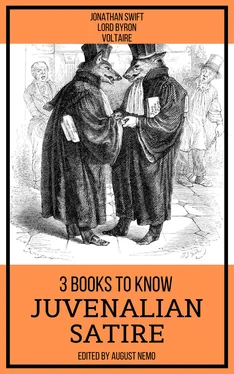With the exception of the second line,
For that same twining 'transport and security'
Are twisted to a phrase of some obscurity.
The poet meant, no doubt, and thus appeals
To the good sense and senses of mankind,
The very thing which every body feels,
As all have found on trial, or may find,
That no one likes to be disturb'd at meals
Or love.—I won't say more about 'entwined'
Or 'transport,' as we knew all that before,
But beg 'Security' will bolt the door.
Young Juan wander'd by the glassy brooks,
Thinking unutterable things; he threw
Himself at length within the leafy nooks
Where the wild branch of the cork forest grew;
There poets find materials for their books,
And every now and then we read them through,
So that their plan and prosody are eligible,
Unless, like Wordsworth, they prove unintelligible.
He, Juan (and not Wordsworth), so pursued
His self-communion with his own high soul,
Until his mighty heart, in its great mood,
Had mitigated part, though not the whole
Of its disease; he did the best he could
With things not very subject to control,
And turn'd, without perceiving his condition,
Like Coleridge, into a metaphysician.
He thought about himself, and the whole earth
Of man the wonderful, and of the stars,
And how the deuce they ever could have birth;
And then he thought of earthquakes, and of wars,
How many miles the moon might have in girth,
Of air-balloons, and of the many bars
To perfect knowledge of the boundless skies;—
And then he thought of Donna Julia's eyes.
In thoughts like these true wisdom may discern
Longings sublime, and aspirations high,
Which some are born with, but the most part learn
To plague themselves withal, they know not why:
'T was strange that one so young should thus concern
His brain about the action of the sky;
If you think 't was philosophy that this did,
I can't help thinking puberty assisted.
He pored upon the leaves, and on the flowers,
And heard a voice in all the winds; and then
He thought of wood-nymphs and immortal bowers,
And how the goddesses came down to men:
He miss'd the pathway, he forgot the hours,
And when he look'd upon his watch again,
He found how much old Time had been a winner—
He also found that he had lost his dinner.
Sometimes he turn'd to gaze upon his book,
Boscan, or Garcilasso;—by the wind
Even as the page is rustled while we look,
So by the poesy of his own mind
Over the mystic leaf his soul was shook,
As if 't were one whereon magicians bind
Their spells, and give them to the passing gale,
According to some good old woman's tale.
Thus would he while his lonely hours away
Dissatisfied, nor knowing what he wanted;
Nor glowing reverie, nor poet's lay,
Could yield his spirit that for which it panted,
A bosom whereon he his head might lay,
And hear the heart beat with the love it granted,
With—several other things, which I forget,
Or which, at least, I need not mention yet.
Those lonely walks, and lengthening reveries,
Could not escape the gentle Julia's eyes;
She saw that Juan was not at his ease;
But that which chiefly may, and must surprise,
Is, that the Donna Inez did not tease
Her only son with question or surmise:
Whether it was she did not see, or would not,
Or, like all very clever people, could not.
This may seem strange, but yet 't is very common;
For instance—gentlemen, whose ladies take
Leave to o'erstep the written rights of woman,
And break the—Which commandment is 't they break?
(I have forgot the number, and think no man
Should rashly quote, for fear of a mistake.)
I say, when these same gentlemen are jealous,
They make some blunder, which their ladies tell us.
A real husband always is suspicious,
But still no less suspects in the wrong place,
Jealous of some one who had no such wishes,
Or pandering blindly to his own disgrace,
By harbouring some dear friend extremely vicious;
The last indeed 's infallibly the case:
And when the spouse and friend are gone off wholly,
He wonders at their vice, and not his folly.
Thus parents also are at times short-sighted;
Though watchful as the lynx, they ne'er discover,
The while the wicked world beholds delighted,
Young Hopeful's mistress, or Miss Fanny's lover,
Till some confounded escapade has blighted
The plan of twenty years, and all is over;
And then the mother cries, the father swears,
And wonders why the devil he got heirs.
But Inez was so anxious, and so clear
Of sight, that I must think, on this occasion,
She had some other motive much more near
For leaving Juan to this new temptation;
But what that motive was, I sha'n't say here;
Perhaps to finish Juan's education,
Perhaps to open Don Alfonso's eyes,
In case he thought his wife too great a prize.
It was upon a day, a summer's day.—
Summer's indeed a very dangerous season,
And so is spring about the end of May;
The sun, no doubt, is the prevailing reason;
But whatsoe'er the cause is, one may say,
And stand convicted of more truth than treason,
That there are months which nature grows more merry in,—
March has its hares, and May must have its heroine.
'T was on a summer's day—the sixth of June:—
I like to be particular in dates,
Not only of the age, and year, but moon;
They are a sort of post-house, where the Fates
Change horses, making history change its tune,
Then spur away o'er empires and o'er states,
Leaving at last not much besides chronology,
Excepting the post-obits of theology.
'T was on the sixth of June, about the hour
Of half-past six—perhaps still nearer seven—
When Julia sate within as pretty a bower
As e'er held houri in that heathenish heaven
Described by Mahomet, and Anacreon Moore,
To whom the lyre and laurels have been given,
With all the trophies of triumphant song—
He won them well, and may he wear them long!
She sate, but not alone; I know not well
How this same interview had taken place,
And even if I knew, I should not tell—
People should hold their tongues in any case;
No matter how or why the thing befell,
But there were she and Juan, face to face—
When two such faces are so, 't would be wise,
But very difficult, to shut their eyes.
How beautiful she look'd! her conscious heart
Glow'd in her cheek, and yet she felt no wrong.
O Love! how perfect is thy mystic art,
Strengthening the weak, and trampling on the strong,
How self-deceitful is the sagest part
Of mortals whom thy lure hath led along—
The precipice she stood on was immense,
So was her creed in her own innocence.
She thought of her own strength, and Juan's youth,
And of the folly of all prudish fears,
Victorious virtue, and domestic truth,
And then of Don Alfonso's fifty years:
I wish these last had not occurr'd, in sooth,
Because that number rarely much endears,
And through all climes, the snowy and the sunny,
Sounds ill in love, whate'er it may in money.
When people say, 'I've told you fifty times,'
They mean to scold, and very often do;
When poets say, 'I've written fifty rhymes,'
They make you dread that they 'll recite them too;
In gangs of fifty, thieves commit their crimes;
At fifty love for love is rare, 't is true,
Читать дальше












